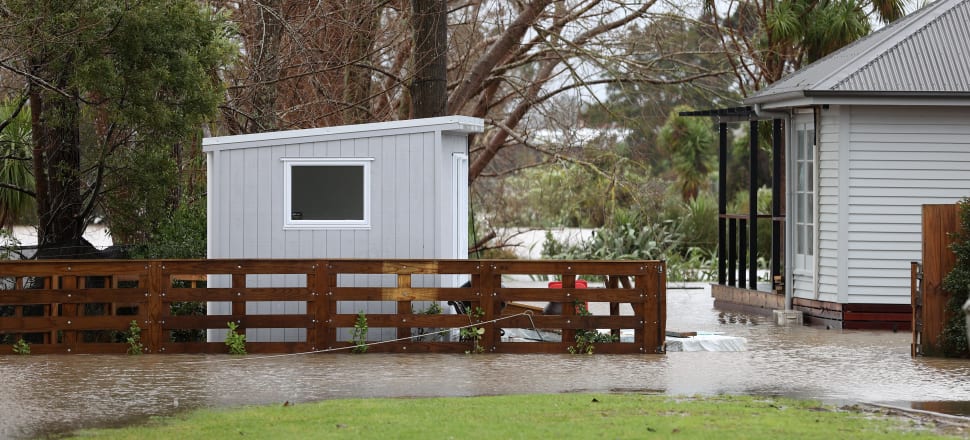
Securing the right to housing will require us to challenge the very systems and ideologies that are doing such harm to our planet.
Opinion: The images of rivers running down our streets, cars floating down the motorway, houses flooded and half-submerged buses ferrying people across the causeway, will stick with us for a lifetime.
Climate change has never felt more real or more urgent.
The events of the past week have made me reflect on how intrinsically connected the fight to realise the right to housing and the fight for climate justice are.
READ MORE:
* State of emergency: Auckland floods ‘a wake-up call’
* Why the sluice-gates didn’t open: ‘We’re petrified it might happen again’
* Auckland’s historic flooding explained in five charts
In that short space of time we've seen the sea rise, the heavens open, and rivers run strong and proud through the streets of our city.
Homes have been destroyed, and there are people today who will be experiencing homelessness for the first time. An experience for some that was never anticipated.
For some, it will be hard, gut-wrenching even, but they'll bounce back. Perhaps they own their home, have good insurance, a solid income. The damage will be a kick in the guts, I can’t even imagine the heart break, the loss, the pain of it all. But they will rebuild. They will start again. And ultimately, they will be okay. But, then there are the others.
As a Westie, I know first-hand how hard it is to find a decent rental in West Auckland. One that is safe, dry, and affordable. Months spent searching, attending viewing after viewing, feeling pressured into making judgments between affordability and liveability. Wondering if it’s worth taking this place, despite the mould and damp, because it means you can stay in your suburb, connected to your community, crunching the numbers to figure out if you can afford to pay enough for the privilege of renting a home that will be safe for your kids to live in.
I wonder how many will return to mouldy and damp rental homes, and be forced to live amid the chaos as the repairs remain "in progress"?
How many will even be able to return to their homes? How many others will be forced to leave their community to find a rental for their whānau? Forced onto a friend’s couch, into their car, or perhaps eventually into a motel?
I think of how that will affect them. The trauma of disconnection and loss, the stress and anxiety homelessness will have on their children
I think of those finding out for the first time that we don't do this well in New Zealand.
Homelessness prevention.
That there is no guaranteed safe, stable, supportive place for you to go if you experience homelessness.
That there is no guarantee you'll be able to access housing again, or at least in a timely manner. That the reality is that the right to housing is not a human right that is fully realised here in Aotearoa.
Then I wonder, how often we are going to see these extreme weather events? How many more whānau can we expect will be displaced by increasing climate catastrophes?
This was meant to be a one-100-year downpour – but then so was the one that hit West Auckland in 2021.
As the impacts of climate change are increasingly felt, we are continually being warned to expect extreme weather events such as the one that hit Auckland to become more and more common.
And as they do, and as whānau are displaced as a result, it is the poor, those we’ve structurally marginalised in our society (in our world even), who will bear the heaviest burden. Not solely because the impact of climate catastrophes on our communities will result in the displacement of whānau, who without the right to housing embedded within a society will risk being forced into homelessness. But equally, because the same logic that would pollute our planet and harm our environment for profit, is the very logic that justified colonisation, stole indigenous land, and through the commodification of housing continues to deny the right to housing to so many of our whānau.
It is the logic inherent within capitalism.
The logic of greed.
The harmful idea that unbridled and unregulated expansion, extraction and growth, is a moral good, regardless of the cost and harm inflicted on our people and our planet.
As the rain continues to pour down, I am reminded of how important it is for climate activists and housing advocates to work together.
To demand accountability for large corporates, whose exploitative and extractive practices are harming our planet and putting all of us at risk for a profit.
To demand an end to the commodification of housing, ensuring instead that the right to housing is enshrined in law, and taken seriously by our Government as the basic human right that it is.
To demand our Government enacts a green new deal that would address the root causes of climate change and social injustice, while outlining a vision for the sort of just, inclusive and connected society we could all create.
Climate change and homelessness are precipitated by the same beast.
These floods, and the social harm, housing insecurity and homelessness that have resulted, are but a warning of what is to come.
To make our communities resilient to climate change, we need to work together.
We cannot fight for the climate at the expense of our structurally marginalised whānau.
The structures that are harming our planet, are equally harming our people.
Securing the right to housing will require us to challenge the very systems and ideologies that are doing such harm to our planet.







